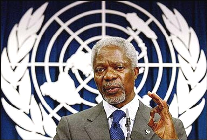UN chief warns of complete lawlessness and anarchy in Sudan’s Darfur
Nov 22, 2005 (UNITED NATIONS) — Secretary-General Kofi Annan warned Monday that Sudan’s volatile Darfur region faces an increasing threat of complete lawlessness and anarchy, and said it is crucial that the government and rebels conclude a peace agreement by the end of the year.
 In his monthly report to the U.N. Security Council, Annan said “a dangerous increase” in violence in Darfur that began in September, and continued in October, is seriously affecting the delivery of humanitarian aid, and has claimed the lives of civilians and five members of the 6,700-strong African Union peacekeeping force.
In his monthly report to the U.N. Security Council, Annan said “a dangerous increase” in violence in Darfur that began in September, and continued in October, is seriously affecting the delivery of humanitarian aid, and has claimed the lives of civilians and five members of the 6,700-strong African Union peacekeeping force.
“Civilians were again displaced from their villages, in some cases for the second or third time,” Annan said. “Moreover, the looming threat of complete lawlessness and anarchy draws nearer, particularly in western Darfur, as warlords, bandits and militia groups grow more aggressive.”
Annan said a further deterioration of the security situation can be averted only by rapidly consolidating the progress made at the sixth round of peace talks between the Sudanese government and Darfur rebels which ended in October.
A new round of peace talks in Abuja, Nigeria, was scheduled to begin on Monday but the Sudan News Agency reported Sunday that the talks had been postponed.
Majzoub Khalifa, the Sudanese negotiator, was quoted as saying he was told by the African Union that the talks could not resume Monday and a new date would be set. No reason was given for the postponement.
Annan’s report, written before the announcement, stressed that “a political solution is paramount.”
To reach a political solution, Annan said, the Sudanese and the international community must coordinate their efforts towards two goals.
“First, they need to lay the groundwork for a successful conclusion to the forthcoming seventh round of the Abuja talks,” he said.
“This round should be final,” Annan stressed. “It is crucial that a framework peace agreement be concluded before the end of the year.”
It is also imperative that the international community, in coordination with the Sudanese parties, start planning immediately for the programs and assistance that will be needed to ensure the successful implementation of any peace agreement, he said.
The Darfur conflict began in February 2003 when rebel groups took up arms against the government, accusing it of neglect and repression of Sudanese of African origin.
The government is accused of supporting a counterinsurgency led by an Arab militia known as the Janjaweed, which has been blamed for widespread killing, rape and arson. The Sudanese government denies backing the Janjaweed.
The United Nations estimates that 180,000 people have died in the conflict, mainly through famine and disease. Several million more have either fled into neighboring Chad or inside Sudan.
Annan reported a sharp increase in violence in September, and “a continuation of this extremely worrying trend” in October. He accused both the rebel Sudan Liberation Movement and the government of continuing “to show a chronic disregard for both the letter and the spirit of the ceasefire agreements they have signed.”
The poor security situation in western Darfur also risks internationalizing the conflict to neighboring Chad, Annan said.
(AP/ST)
